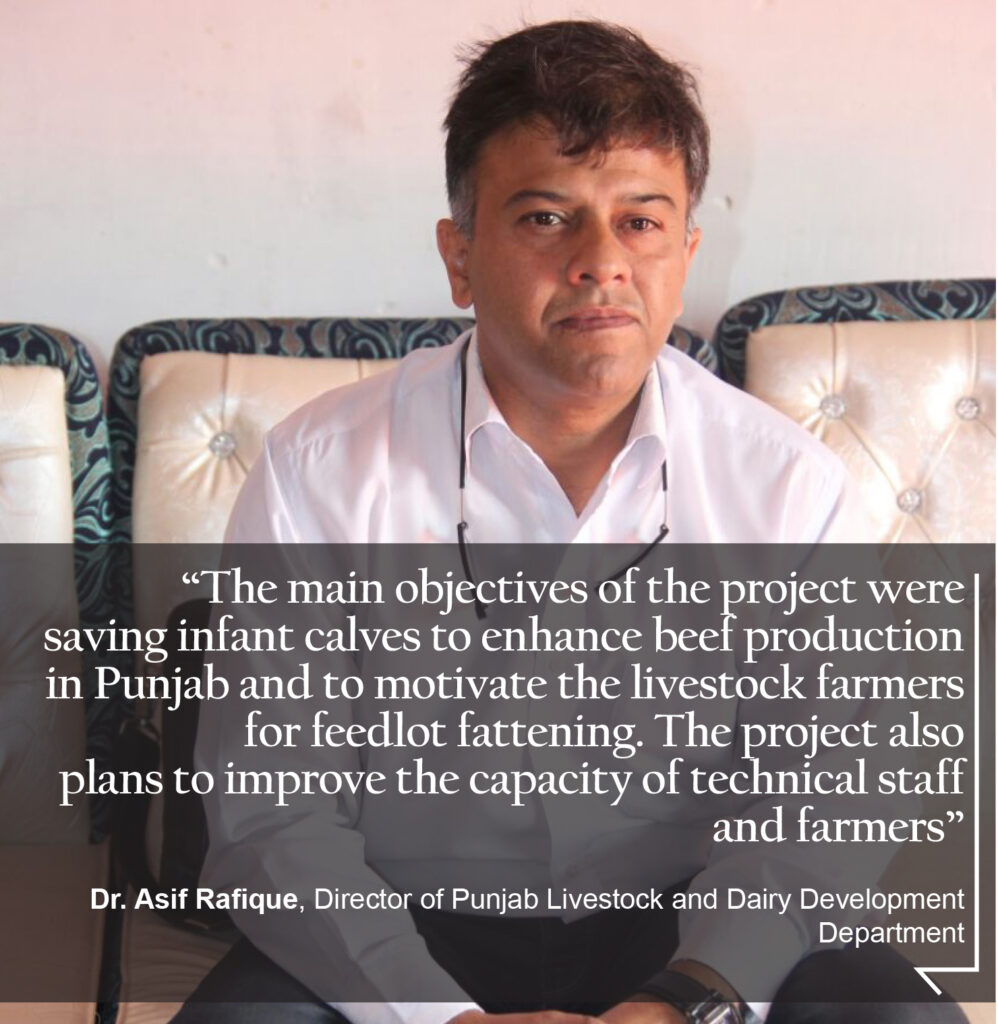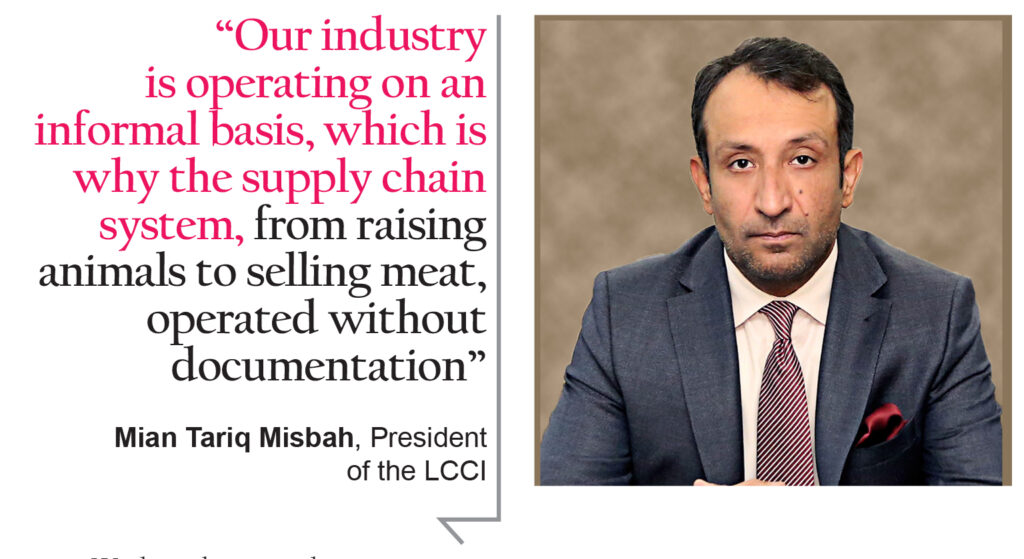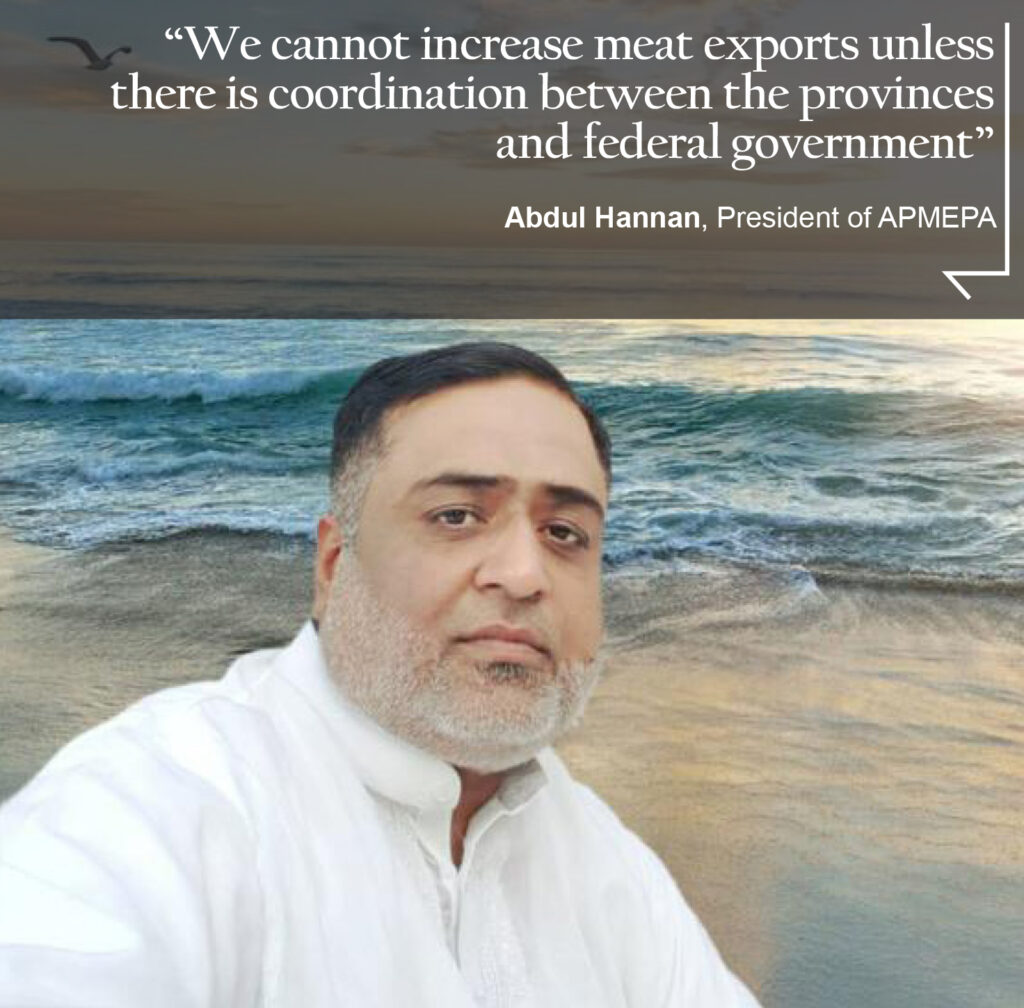Agricultural economies are often confused with agrarian ones. The former include all kinds of agriculture, including livestock, while the latter specifically has to do with the cultivation of land. While Pakistan is definitely high on the agrarian agenda, it is an agricultural economy, and one dominated by the livestock sector.
According to the Economic Survey of Pakistan for fiscal year 2020, livestock contributes around 60% to the total agriculture sector, 11.7% to total Gross Domestic Product (GDP) and 3.1% to Pakistan’s exports. Even though Pakistan is clearly a large meat producer, it only ranks 18th in world meat exports, and only serves 3% of the global market.
The numbers, while not great, are also not surprising. Pakistan is constantly grappling with economic crises. From energy to law and order and basic economic infrastructural weakness, every aspect of the economy remains far from achieving its potential. But with Pakistan’s geographic position and high quality livestock, the halal meat industry is one of the many export options that Pakistan is looking to fully exploit now as the government continues on its pro-export mission. But is it worth the effort?
Industry potential
According to the data obtained by the Ministry of National Food Security and Research, the total volume of meat production in Pakistan during the fiscal year 2019-20 was 4,708 tonnes of which, 2303 tonnes of beef, 748 tonnes of mutton and 1657 tonnes of poultry meat were produced. Over the course of the last three years, there has been a slight increase in meat production every year, largely due to population growth.
With its contributions to the GDP and as the major chunk of the agricultural sector, why exactly is livestock farming not a bigger moneymaker in Pakistan? For starters, despite what the meat industry says, Pakistan’s meat is not very high-quality. Deficiency in the feed that livestock is given means mineral deficiency in the livestock.
But the caloric and nutritional value of livestock is not the only thing that is compromised because of the deficiency in the feed. It also results in low productivity, poor health of the animals, and reproductive problems. A number of research papers about the different areas of Punjab have shown that a lot of the soil in the region is low on minerals, which results in deficient feeds. While this is a contributing factor, there is also a desire for meat farmers to reduce the cost of doing business.
Currently, more so because of its location than anything else, Pakistan’s meat industry has been in the global market for a long time because Pakistan’s red meat is in great demand in the Middle East and Southeast Asian countries. It also has to do with the demand for halal meat in these countries, which Pakistan provides.

For Muslims, halal food has fundamental religious significance. Muslims in any corner of the world consume halal food, and with 1.8 billion adherent to Islam in the world, halal meat is needed everywhere. Arab and European countries are major hubs of export in this regard. Traditionally, Pakistan has exported to the middle east, and has had a contentious relationship with the European market, which has not always been happy with the quality of meat Pakistan exports. While the meat itself is fine, it is the stringent EU regulations about packaging, processing, and shipping that raise costs for exporters.
But while these exports have been going on for years, the potential that has remained untapped is outside these traditional markets. According to a report by the Foreign Agricultural Service (FAS) branch of the United States department of Agriculture, Brazil is the top exporter of halal meat, while Australia is the second and India is the third. These countries increase their yields to export to regions like Central Asia and North America as well, because there is a great demand for halal meat there as well.
The problem is, these three countries have established themselves as hubs of halal meat production, and Pakistan is way down on the list, ranking at 18. However, some feel that if Pakistan plays its cards right, they could catch a significant share of this market for themselves. For starters, Pakistan is a Muslim majority country and a self professed Islamic Republic. While there is no difference in the ‘halal’ nature of the meat from Pakistan and Brazil, Pakistan could possibly use this to brand themselves better. The idea is to no longer have a demand for halal meat, but for halal meat from Pakistan. But there are issues with this, the most significant of which is that meat production at home is not easy.
The problems with production
The biggest hurdle in the halal meat exports industry is the cost of doing business. As Mian Tariq Misbah, president of the Lahore Chambers of Commerce and Industry (LCCI), explains, in terms of global competitiveness, higher prices reduce exports. “If we look at our neighboring countries, the halal food industry is subsidized in electricity rates, while in our country these prices are higher. Similarly, the halal food industry also requires a lot of raw materials, the import duties of which are very high.”
The statement is an obvious one. It is another industry complaining that the government is not doing enough for it and that it needs help from the top to prosper. The more difficult questions are why Pakistan has failed to effectively brand its halal meat exports, and why the industry has failed to modernise. To his credit, Mian Tariq accepts that the industry has a long way to go.
“Our industry is operating on an informal basis, which is why the supply chain system, from raising animals to selling meat, operated without documentation,” he says. “We also have a shortage of suitable slaughterhouses and animals are bought mostly from rural areas where traders buy animals and later sell them in the cities.”
“In this process of buying and selling of animals, the quality of animal health is not checked and they are not properly vaccinated. Similarly, butchers buy disabled and sick animals at low prices and their meat is sold in the market, which is against the rules of hygiene. Due to this formal attitude of the market, we also face problems in international export of meat. If everything in the supply chain system is correct, then the quality of the animals will also remain correct. By correcting this market attitude, we can eliminate the problem of meat supply at the national and international levels.”

The president LCCI said that Pakistani meat exporters have to get halal certification from every international export market. However, this is an expensive process, and one that hinders our export competitiveness. Pakistan has also not yet been able to form a unified local halal accreditation body for which every Pakistani exporter has to obtain a halal certificate from the global halal food market and the competition for our exporters is further enhanced.
“In July 2015, the National Assembly passed a bill to establish the Pakistan Halal Authority (PHA) to address the problems of meat exporters, but the authority has not yet become operational due to administrative delays. If the issue of Halal Certificate is resolved, the exporter will be facilitated and our meat exports will also increase,” says Misbah.
Misbah believed that our lack of technical expertise in the industry is hampering the growth of this potentially lucrative sector. Meat-importing countries prefer that the structure of their suppliers be strengthened and safety regulations be fully implemented. Similarly, technical knowledge is required in meat handling, such as storage, logistics, marketing, certification and slaughter, which we unfortunately lack.
But once again, despite all of these shortcomings, the industry eventually comes back down to the same complaint of the government not being supportive enough, with no mention of what they planned on doing on their own. “There is no tax break in the establishment of the SlaughterHouse and the EDF (Export Development Fund) does not help in obtaining expensive certification. If the government provides these facilities, meat exports can be accelerated,” says Misbah.
“The lack of special halal processing zones in the country is also a serious problem. Having such zones will not only give investors a tax holiday but also a tax exemption on the import of halal food machinery, plants and other goods. Due to the unavailability of such zones, private investors are reluctant to jump in this business.”
When asked about why Pakistan’ meat quality is questioned, Mian Tariq admitted that there is a rampant issue in the meat industry of producers using hormone injections to boost poultry production. This results in higher yield, but weaker chickens and worse meat. The result is that rather than producing the best cuts of poultry, producers choose to take the easy route of producing by-products and frozen foods.
“We do not have a conducive environment for breeding cattle and poultry. There is a lack of facilities like cold storage which freezes the food and maintains its temperature and quality. We also lack adequate packaging and labeling, as well as modern facilities for post-harvest storage,” he says. As expected, the meat industry itself plans to do nothing about it except wait for the government to come rescue them.
“If the exports of the meat industry are to be increased, it should also be given an incentive package like the construction industry,” says Mian Tariq. “The government should provide incentive packages to the industry through which state-of-the-art slaughterhouses can be set up which are in line with international standards and have a system for post-harvest storage for which interest free loans can be provided to investors.”
The basic premise is that the government should encourage the private sector through such packages to develop certification labs in a modern style. Pakistan’s halal meat industry has the capacity to produce four to five percent more meat after meeting local demand, which means we already have the potential to export more. But why should the government do this? Why should they agree to facilitate the export of halal meat and give a 20% rebate on export duties for the halal meat industry for the next five years? There are many industries that have potential, does the government have to rescue all of them? Or will they ever themselves move out of their sloth to innovate and try to work through these problems instead of lamenting and waiting it out?
Continued demands from the government
The list of demands from the government continues. It is true, the government must invest in its own industries, but how far must they go? The industry wants the government to set up halal processing zones and give first priority to Lahore in this regard as the development of halal processing zones here could provide a major platform to exporters. Good health care systems need to be developed and hormone injections should be discouraged. Attention also needs to be paid to improving exports in the poultry industry.
“It is also important for the government to set up an integrated halal food agency where all halal certification agencies can be registered and this agency should also be registered in all halal food importing countries so that exporters do not have to worry about certification issues. Thailand has a model in front of Pakistan to increase the export of halal food,” says Mian Tariq.

The example that meat producers give is of Thailand, where there is a government agency called the Halal Standards Institute of Thailand, which prepares halal certificates for exporters there. Pakistani exporters want a similar agency, which sets standards keeping in mind Islamic principles. Under halal products, Pakistan operates only in the raw meat industry, while there are many other parts of halal food that are also profitable, such as processed food products, value-added meat products and beverages.
“We also need to take advantage of this very effectively, keeping in mind the global demand. We need to connect with markets such as the United Kingdom, the United States, Vietnam, Canada, France and the United Arab Emirates, as profit margins are high and Muslims are in large numbers. Similarly, Chinese markets can be potential for exporting halal food, but for all that, we have to focus on maintaining international standards.”
How to improve our meat
Dr. Asif Rafique who is the Director of Punjab Livestock and Dairy Development Department (PL&DD) informed Profit that during November 2019, they initiated a project ‘Enhancing Beef Production through Save the Buffalo Calves and Feedlot Fattening’.
“The main objectives of the project were saving infant calves to enhance beef production in Punjab and to motivate the livestock farmers for feedlot fattening. The project also plans to improve the capacity of technical staff and farmers regarding the management of beef farming systems,” he explains.
The target of the year 2019-20 was to register 40,000 buffalo calves for saving and 30,000 calves for feedlot fattening. The actual results entail that 31,328 farmers registered 40,136 calves for saving, and 9,086 farmers registered 30,401 calves for feedlot fattening.
According to Rafique meat is usually obtained from dairy animals or animals used in agriculture in Pakistan. When these animals reach their natural age, they are slaughtered, while the other source of meat is buffalo calves. They [buffalo calves] are usually emaciated due to a lack of proper nutrition and care. In Pakistan, millions of calves die or are sold before the age of one year every year because farmers avoid feeding buffaloes to these calves. If these calves are fed and cared for by the buffalo milk for the first three months, not only can they be saved, but the shortage of meat in the country can also be met by making them fat.
He further said that under the said project, animals of one to 30 days were registered for 120 days and weighed every fortnight. “The animal must gain 300 grams of weight daily. Under this programme, farmers are also given RS 6,500 per animal as food. Similarly, under the feedlot fattening programme, calves of one to one and a half years of age are registered for 90 days.”
The weight of each animal is checked after 15 days, while under this program, the animal must gain at least 700 grams of weight daily. Under this program, farmers are given RS 4,000 per animal as food. In view of the growing population of the country, the maximum increase in milk, egg, and meat production is inevitable. “Under this programme, we have entered into agreements with the farmers and issued all the instructions to the farmers regarding proper care of animal feed. Buffalo meat is 32 percent lower in cholesterol and 55 per cent lower in calories than cow meat, and higher in protein, minerals, and vitamins. Due to these characteristics, the demand for buffalo meat is high in our country and international market as well,” he concluded.
To this end, efforts are being made to modernize and make Pakistan’s meat industry world quality. In a recent letter obtained by Profit, the Trade Wing Embassy of Pakistan, Moscow wrote to the All Pakistan Meat Exporters & Processors Association (APMEPA) which states, that Russia’s Federal Service for Veterinary and Phytosanitary Surveillance, Rosselkhoznadzor, will send its experts of animal quarantine department for inspection of two Pakistani meat and meat products producers.
The process for this has been initiated, and currently Russian veterinary watchdog is studying the materials on the safety control system for the production of animal products in Pakistan, which has been provided to local producers by the Ministry of National Food Security & Research, Islamabad. The final decision to send experts to Pakistan will be made after Rosselkhoznadzor thoroughly studies all the submitted materials.
However, Abdul Hannan, president of APMEPA, also complains to the government about the export of meat. Speaking to Profit he said that the government only needs to adjust its direction to increase meat exports. “The biggest problem of our country is that the meat we are exporting to the Gulf countries is because of food security there and on the day when these countries will focus on food safety instead of food security, our exports from there will also stop.”
Hannan stressed that the government should formulate policies instead of subsidies that would reveal the characteristics of Pakistan’s meat in the international markets. “It is the job of the Ministry of National Food Security and Research, which comes under the federal government, to present Pakistan’s meat and its quality at the international level.”
However, he does make an interesting point after this. Ever since the provinces have gained autonomy under the 18th amendment, the livestock department of each province has come under its own ministry and each province has been busy formulating its own policies. While this has helped the provinces, there is no coordination between them to facilitate exports.
“When the Prime Minister Imran Khan returned from his visit to Malaysia, he had a meeting with meat exporters in which he said that the Prime Minister of Malaysia had asked him why the meat in Malaysia does not come from Pakistan,” he said. “In response, I asked him if he had yet to ask the Ministry of National Food Security and Research why there was no meat export in Malaysia and the PM could not answer my question. We cannot increase meat exports unless there is coordination between the provinces and federal government.”

























I compliment Profit to their investments in R&D., to the release of this article.
Suggest only one solution standardisation/Digitisation of the industry, procedures, Halal, all matters are resolved.
Pakistan produces the best mutton, beaf available for the organic meats.
Please standardise/digitise the industry, products, procedures, for storage/freeze, slaughter, quality of live stock ratings, meat ratings, and dis-claimer.
Give quality to your prospect, and take profits to your home.
I’m veterinarian … i want internship in halal meat factory…please give me reply